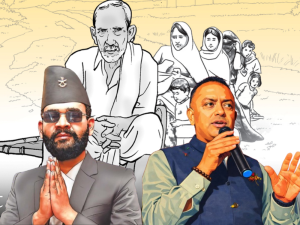Columns
Flag-waving duplicity
Nationalism and national interest are not natural bedfellows, although politicians tend to conflate the two.
Avasna Pandey
Nepali politicians seem to have a strange attachment with the word “national interest”. From Pushpa Kamal Dahal to KP Sharma Oli to Sher Bahadur Deuba, leaders across the political spectrum use the term national interest to lend legitimacy to any argument or decision. In 2016, Oli’s Nepal Communist Party was determined to block the Constitution Amendment Bill, citing it could put national interest at risk. In the same year, Dahal, before embarking on a three-day state visit to India, had told the media to not let the people dictate to him what to do and let him “take the risk in favour of national interest”. Dahal's latest obsession with the word was evident during the Millennium Challenge Corporation (MCC) episode—an American grant worth $500 million—where he successfully created paranoia among the citizenry, making them erupt into protests and indulge in heated television debates.
In fact, Dahal and other political leaders' speech act regarding the MCC turned social media into a public sphere that provided a collective interpretation of constructed threats regarding the American army entering Nepali soil and we losing our independence and sovereign rights. Social media was so potent in shaping the security debate that it gave rise to “lay” actors in the equation. For example, writing “No MCC'' on truck backs offered insights into how security was being constructed locally without the voice of non-elite actors within the security debate. Leaders tirelessly said the MCC hampered Nepal’s national interest and we all bought that narrative without even considering the concoction that makes national interest. Leaders harped on the overly abused tactic of nationalism even as they claim to be speaking for the national interest. But nationalism and national interest are not natural bedfellows.
National interest forms a cardinal pillar of international relations that encompasses political interests, security interests, economic interests, cultural interests and other interests of a country. They must be formulated once there is a shared understanding of the central problems that policies must address, making determining national interests an integral part of strategic thinking. No doubt, The Fifteenth Plan (fiscal years 2019-20 to 2023-24) formulated by the Nepal Planning Commission has mentioned the term "national interest" 18 times in its document, pointing to readers the things leaders and policymakers must be mindful of before working out any plans and goals for the country.
The full picture
Article 5.1 of the Constitution of Nepal defines national interest as “Safeguarding of the freedom, sovereignty, territorial integrity, nationality, independence and dignity of Nepal, the rights of the Nepali people, border security, economic wellbeing and prosperity shall be the basic elements of the national interest of Nepal.” This definition is all-encompassing, from sovereignty, territorial integrity to the Nepali people's wellbeing. National interest is an umbrella term, and national security, prosperity and social well-being fall under it. But they cannot be viewed in isolation as one makes way for the other. Feeling secure enables us to create prosperity; prosperity channels funds to strengthen security measures further–both physically and philosophically, with social wellbeing being a by-product of a secure, prosperous society. Twisting and shrinking the meaning of national interest to mean only safeguarding Nepal’s sovereignty and territorial integrity is problematic.
International politics has undergone a sea change, and it's hard to draw a distinct pattern for any state's behaviour. Yet, the dominant understanding among our political class is that the world is organised along the conventional dimensions of power, alliance and geography. The danger of this parochial interpretation is that it focuses on the defining threats only from external factors that completely exonerate the actors, cashing on those threats for their personal gain in the process. Such an understanding of national interest prevailed until the MCC was finally ratified in Parliament, but not without witnessing a violent protest where protesters had gone to the extent of digging out concrete blocks from the New Baneshwor pavements and hurling them at police.
An overemphasis on safeguarding independence and the authority of a state to govern itself made us anxious to conclude that the American army would take over Nepal, jeopardising our territorial integrity. But even the second half of the definition of what constitutes national interest as per the constitution mentions safeguarding the economic wellbeing and prosperity of the Nepali people. Other official documents, too, such as the Fifteenth Plan, have recognised that trade and commerce play an indispensable role in rapid economic growth.
Clearly, then, welcoming foreign capital and technological investment that would help generate employment in the country and advance the narrative of "bikas" cannot be against our national interest. This is not to say that we must blindly agree to every terms and condition before signing any agreement with foreign countries, but the political elite resorted to using the expression of national interest as an instrument of political action for discouraging the American grant.
The emotions evoked in the name of national security did help leaders buy some time, but it almost defaced Nepal in the international arena and ignited trust issues amongst allies. What’s more, China, who until now never intervened directly in Nepal’s political matters presented itself in a high handed manner, dictating the kind of decision it wanted us to take when it came to ratifying the MCC. How does that kind of reputational damage and open space for undermining sovereignty serve Nepal’s national interest?
Nations as stories
Determining national interests means choosing values. So, when statesmen use such loaded terms, one must be cautious of the kind of value they are choosing to protect. Is the power of speech being used to put forth values that benefit a country, such as freedom, justice, independence, prosperity and so on or values that squarely serve the leader or politician, which in our case is often retaining power and staying politically relevant?
As a country, what we hold dear and let go of is often determined by the stories we tell ourselves and our generations. The tales of our public past shape how we interpret and respond to and show up for the present. And these stories speak directly to the emotions and preconceptions that form the bedrock of our political positions and engagement. We are “bir” Gorkhalis, but we are also Nepalis living in an interconnected world.
True, the changes in the United States-China strategic competition has become more pronounced than ever, but that changing reality need not deter other countries from doing what they can to strengthen economic rules, open their own markets, and broaden their relationship with the major powers. In fact, any leadership and public policy must be guided by the intention to deliver the most for prosperity, security and wellbeing of the people it serves. Using prosperity, security and wellbeing as competing for alternatives to be traded off against each other might seem instrumental for the people in authoritative positions, but does a grave disservice to the larger citizenry.
Countries can determine (and many have) their own destiny even when circumstances are complex or change. Their ability to strike that delicate balance between neighbours and not be bullied by any country ensures any nation’s national security. There is a thin line between agency and victimhood, and how we present these stories and exercise our agency as a country to ensure the economic and social wellbeing of all is in our national interest.




 12.53°C Kathmandu
12.53°C Kathmandu



.jpg&w=200&height=120)











